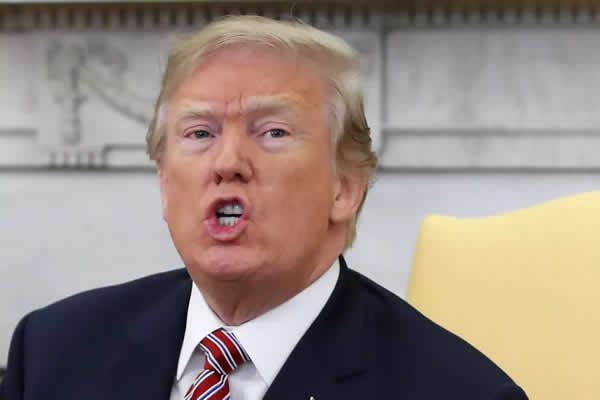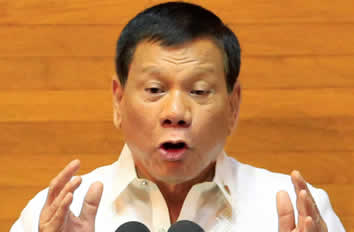|

U.S. President Donald Trump. Photo
by Mark Wilson/Getty Images
 .S.
President Donald Trump has been a relentless critic of the press even
before he became president. During his campaign, Trump railed against
the media and popularized the term “fake news.” .S.
President Donald Trump has been a relentless critic of the press even
before he became president. During his campaign, Trump railed against
the media and popularized the term “fake news.”
After
his election victory Trump never eased up on the press. In fact, he
doubled down. And from the media’s perspective, Trumps first year in
office provided newsmen with a wealth of material to use against him.
His unorthodox behavior, and his playing fast and loose with the facts,
has become fodder for serious journalists and late-night comedians
alike.
Thanks to Trump, the words “fake news” are now used across the
globe. And although attacking the media may seem innocuous to Americans,
the New York Times has nevertheless described it as “increasingly
dangerous.” Taking that paper’s perspective, and carrying it a step
further, a recent editorial in the Toronto Star notes that the danger of
Trump’s media attacks are more immediate on foreign media than on
American media.
The
Star’s insightful editorial states that “the most immediate danger
seems to be abroad, where journalists routinely put their lives on the
line to report on regimes with little tradition of democracy or a free
press.
Trump’s attacks on the press gives even more license to those regimes to
crack down on media, whose scrutiny they simply don’t like. It threatens
burgeoning free speech rights and undermines faith in the media’s
efforts to expose those government’s shortcomings.
Indeed, a report published in the Index on Censorship earlier this year
found more than 20 political leaders worldwide, from both authoritarian
and democratic regimes, had used the term ‘fake news’ to discredit
journalism they did not like.”
Like
Trump, President Rodrigo Duterte and members of his administration seem
to use the term “fake news” a lot more these days. News stories
that are critical of Duterte, or do not toe the government’s line, are
often called fake news.
The
problem for the Philippines is its democratic institutions are not as
robust or as mature as those in the United States.
The First Amendment
to the U.S. Constitution guarantees, among other things, freedom of
speech, and freedom of the press. In addition, America has over 200
years of tradition that has strengthened those rights. Their roots run
deep, and are not easily uprooted.

Philippine President Rodrigo Duterte. Photo:
HuffingtonPost
By
Contrast, a free and independent Philippine press is relatively young
and still without the deep roots or traditions to adequately protect
members of the press. In addition, the almost two decades of dictatorial
rule by Ferdinand Marcos has stunted the growth of democratic
institutions meant to protect the people and the press. And who can
forget the Maguindanao massacre in 2009, that killed 32 Philippine
journalists in single day.
Thus,
Philippine journalists may be putting their lives on the line whenever
they publish or air anything controversial. Also, Philippine libel laws
seem written to further intimidate the press. In addition, the
significant rise extra-judicial killing (EJK) has already scared away,
or silenced many in the profession.
The
problem for the Philippines is that democracy can exist only with a free
and independent press. When power is placed in the hands of the people,
they need to know the truth in order to make educated choices in the
ballot box. But when truth is manipulated by those in power, then the
will of the people is likewise manipulated.
In
the United States, with all its safeguards in place, Americans are only
now finding out about Russia’s concerted effort to manipulate the
outcome of their 2016 presidential election. Its use of fake social
media accounts, and widespread use of trolls to alter popular opinion,
should serve as a warning to all Filipinos. If it happened in the U.S.,
it most certainly can happen in the Philippines.
Philippine media will need to close ranks and speak with one voice
against efforts to undermine it. It should also strengthen its ties to
global institutions that promote a free press. But if instead, it cowers
in fear, or allows itself to be reigned-in by those intent on hiding the
truth, then Philippine democracy might soon be a thing of the past.
For
the average Pinoy, it is important that we strive to become smarter
consumers of the news. We must be steadfast in our support of a free and
independent press. Filipinos, from all walks of life, must band together
and push back against any effort to unlawfully constrain the media.
Hopefully, over time the Philippines will develop its own homegrown
traditions and institutions that will strengthen and protect press
freedom well into the future.
Published 8/6/2018 |